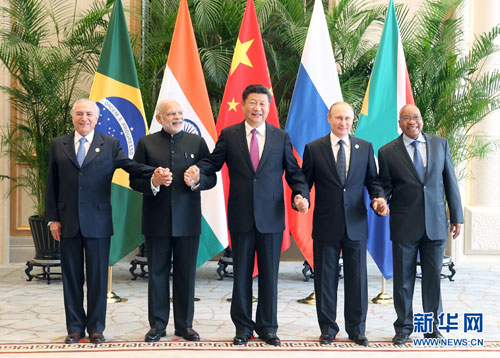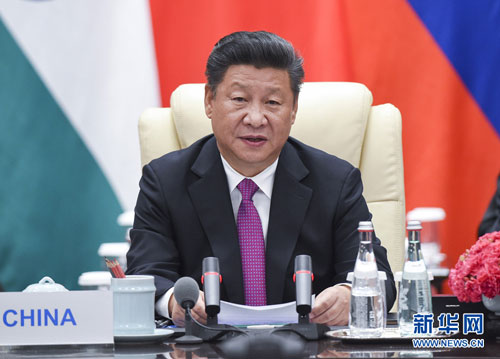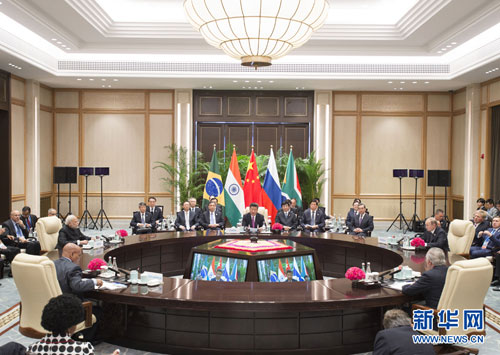
On September 4, 2016, President Xi Jinping, Prime Minister Narendra Modi of India, President Jacob Zuma of South Africa, President Michel Temer of Brazil and President Vladimir Putin of Russia attended the BRICS Leaders' Informal Meeting held in Hangzhou. Leaders of the five countries exchanged in-depth views on deepening cooperation among BRICS countries and jointly dealing with current challenges.
Xi Jinping pointed out in the welcoming speech that cooperation among BRICS countries this year has maintained a sound momentum of development with further expanded fields and increasingly visible achievements. BRICS countries play a leading role in emerging markets and developing countries, and are important members of the G20 as well. We should follow the historical trend, keep up with major international situation and enhance coordination and cooperation, so as to properly build, maintain and develop the two important platforms of the BRICS and the G20, and push for greater contributions of emerging markets and developing countries to international affairs.
The meeting was chaired by Prime Minister Narendra Modi of India, rotating presidency of the BRICS.
Xi Jinping pointed out in his speech that current world economy is experiencing a transition where old growth drivers are being placed by new ones, resulting in slow and sluggish recovery. BRICS countries face frequent waves although their international environment is stable on the whole. Facing the new situation, we should stay confident and firm, and be aware of the strength and potential of BRICS countries as well as the vigor of emerging markets and developing countries represented by BRICS countries. As long as we consolidate the foundation, properly solve current problems and challenges, strengthen unity, and deepen mutual trust and cooperation, we are sure to embrace a new situation for BRICS cooperation.

Xi Jinping put forward four proposals on enhancing BRICS cooperation.
First, jointly innovate in growth patterns. By seizing the opportunity that China is promoting the formulation of a G20 blueprint on innovative growth, BRICS countries should accelerate the implementation of innovation-driven development strategies, maintain efforts in expanding overall demand, deepen structural reform, renovate and upgrade traditional comparative advantages, and enhance mid-to-long-term growth potential. All sides should earnestly carry out the BRICS Economic Partnership Strategy adopted at the Ufa Summit last year, and create a new situation for the merging of trade and investment, the flow of currency and finance, the connectivity in infrastructure, and the exchanges of personnel and culture, forging a powerful synergy with complementary advantages and strengthened interconnection.
Second, jointly improve global governance. BRICS countries should continue to strengthen communication and cooperation within the G20 framework, actively promote the governance structure reform of the International Monetary Fund and the World Bank, and increase the representativeness and voice of emerging markets and developing countries. The five countries should firmly maintain the position of multilateral trade system as the main channel, jointly build an open world economy, and oppose protectionism and exclusionism in all forms to ensure equality in development rights, opportunities and rules of all countries. The BRICS should promote the BRICS New Development Bank to launch its first batch of projects as soon as possible, constantly improve its management level and financing capacity, and step up macro study on the Contingent Reserves Arrangement in order to strengthen the financial security network for BRICS countries.
Third, jointly safeguard international fairness and justice and build a peaceful and stable development environment. BRICS countries should continue to strengthen political security cooperation on the basis of respecting each other's concerns and accommodating each other's interests. The BRICS should safeguard the purpose and principles of the UN Charter, maintain the fundamental principles of international relations, push forward the construction of a new type of international relations featuring win-win cooperation, and create a peaceful, stable, just and reasonable international order. All sides should stick to choosing the development path based on their own national conditions and firmly oppose the intervention of external forces in their domestic affairs. The five countries should strengthen practical cooperation in such areas as anti-terrorism, outer space, energy security and network security within the BRICS framework, and promote international rules which can reflect each party's interests and concerns in a balanced manner.
Fourth, jointly advance international cooperation in development and follow the path of sustainable development. All sides should strive for the effective docking of domestic development strategies and international development agendas. In line with the G20 Action Plan for the Implementation of the 2030 Agenda for Sustainable Development, BRICS countries should actively build a new type of global development partnership, and call on developed countries to fulfill their commitments of providing strong support for developing countries to achieve development goals. South-South cooperation should be strengthened to help other developing countries reinforce their development capacities, boarding them on the development express of BRICS countries. The five countries should boost practical cooperation within the BRICS framework, join hands to implement the 2030 Agenda for Sustainable Development, and try to forge a new development pattern featuring joint construction by all stakeholders, balanced progress in all fields and shared prosperity for all classes.
Xi Jinping stressed that it has been ten years for BRICS cooperation since the first BRICS Foreign Ministers' Meeting. It is believed that BRICS countries will surely achieve greater development as long as we uphold the BRICS spirit of openness, inclusiveness, cooperation and win-win results and continuously strengthen partnership despite hardship, distractions and difficulties.

Attending leaders held that remaining the outlook and impetus of economic growth, BRICS countries will continue to serve as an important engine for global economic growth. BRICS countries should, guided by the principles of openness, unity, equality, mutual understanding, inclusiveness and mutually beneficial cooperation, further strengthen strategic partnership and promote the establishment of an equal and fair international order on the basis of the international law.
Present leaders congratulated China on assuming the G20 presidency in 2016 and voiced their support. They are confident that the Hangzhou Summit will achieve fruitful results. Leaders of the five countries appreciated the importance China has attached to the agenda of development as the presidency, and agreed to intensify coordination on global issues of common concern of BRICS countries within the G20 framework and strengthen dialogues and cooperation with other emerging markets and developing countries.
Attending leaders exchanged extensive views on significant issues of common concern such as the world economy, security and global governance.
Wang Huning, Wang Yang, Li Zhanshu, Yang Jiechi and others attended the meeting.
